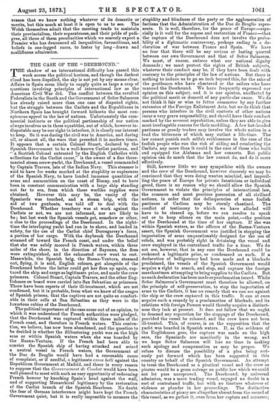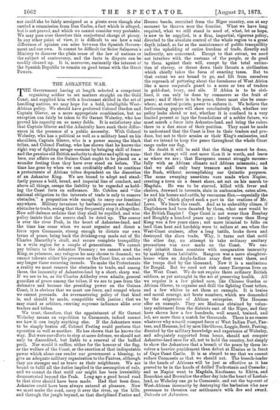THE CASE OF THE " DEERHOUND."
THE shadow of an international difficulty has passed this week across the political horizon, and though the darkest cloud has been dispelled, the sky is not yet by any means clear. Affairs in Spain seem likely to supply quite as large a crop of questions involving principles of international law as the American Civil War did. The conflict between the revolted Federalists in the South and the Government of Senor Salmeron has already raised more than one case of disputed rights, but the struggle between the Carlists and the Republicans in Northern Spain has brought forward hitherto the most con- spicuous appeal to the law of nations. Unfortunately the com- mercial instincts or the political partisanship of our nation always involves us in these squabbles, out of which, however in- disputable may be our right to interfere, it is clearly our interest 'to keep. So it was during the civil war in America, and during all, or almost all, the wars that preceded it in modern times. It appears that a certain Colonel Stuart, declared by the Spanish Government to be a well-known Carlist partisan, and ." a Scottish Colonel entrusted by the English Catholics with collections for the Carlist cause," is the owner of a fine three- masted steam screw-yacht, the Deerhound, a vessel commanded by Captain Travers, late of the Indian Navy. This steamer is said to have for weeks mocked at the stupidity or supineness of the Spanish Navy, to have landed immense quantities of arms and ammunition on the coast of Biscay, and to have been in constant communication with a large ship standing out far to sea, from which these warlike supplies were obtained. However this may be, the vanity of the 'Spaniards was touched, and a steam brig, with the aid of two gunboats, was told off to deal with the Deerhound. Whether treachery was at work against the Carlists or not, we are not informed, nor are likely to be ; but last week the Spanish vessels got, somehow or other, a clue to the proceedings of the Deerhound. In the night- time the interloping yacht had run in to shore, and landed in safety, for the use of the Carlist chief Dorregarray's force, a portion of her cargo. With the daybreak the Deerhound steamed off toward the French coast, and under the belief that she was safely moored in French waters, within three miles of the shore, in the direction of Bayonne, the fires were extinguished, and the exhausted crew went to rest. Meanwhile, the Spanish brig, the Buena-Ventura, steamed out, flying, it is said, English colours, got alongside of the Deerhound before the latter could get her fires up again, cap- tured the ship and cargo as legitimate prize, and made the crew 'prisoners. Colonel Stuart, Captain Travers, and the other Eng- lishmen on board were carried into San Sebastian as prisoners. There have been reports of their ill-treatment, which are not confirmed, but it is probable, from what we know of the usages of Spanish prisons, that the captives are not quite so comfort- able in their cells at San Sebastian as they were in the luxurious cabins of the Deerhound.
The political importance of the case arose out of an opinion, to which it was understood the French authorities were pledged, that the Deerhound was captured within three miles of the French coast, and therefore in French waters. This conten- tion, we believe, has now been abandoned, and the question to be decided is whether the filibustering yacht was on the high seas or within Spanish waters when she was boarded by the Baena-Ventura. If the French had been able to convict the Spanish ship of having attacked and seized a neutral vessel in French waters, the Government of the Dac de Broglie would have had a reasonable cause of complaint, or if needful, a legitimate easus belli against the -Republican Government at Madrid, and there is every reason to suppose that the Gouvernement de Combat would have been well pleased to meet with such an easy opportunity of redeeming French honour by knocking Spain's head against the wall, and of supporting Monarchical legitimacy by the restoration of the Carlist branch of the Spanish Bourbons. No doubt the fear of German interference might have kept the French Government quiet, but it is really impossible to measure the
stupidity and blindness of the party or the agglomeration of factions that the Administration of the Due de Broglie repre- sents. It is well, therefore, for the peace of Europe—espe- cially is it well for the repose and restoration of France—that the capture of the Deerhound does not involve the proba- bility of a diplomatic controversy, perhaps ending in a de- claration of war between France and Spain. We have no fear that there will be any serious or lasting quarrel between our own Government and that of Senor Salmeron. We must, of course, enforce what our national dignity demands ; we must protect the rights of British subjects, whatever their conduct may be, if they have been dealt with contrary to the principles of the law of nations. But there is nothing to induce us to go an inch beyond this, for the sake of the gentlemen who have chartered or the sailors who have manned the Deerhound. We have frequently expressed our opinion on this subject, and it is our opinion, unaffected by the political merit or demerit of any particular cause. We do not think it fair or wise to fetter commerce by any further extension of the Foreign Enlistment Acts, but we do think that persons who interfere in the civil contests of other nations incur a very grave responsibility, and should have their conduct marked by the severest reprobation, unless they are able to give most irrefragable reasons for their meddling. A few hot-headed partisans or greedy traders may involve the whole nation in a feud the bitterness of which may outlast a life-time. The law cannot punish such selfish recklessness in the case of the foolish people who run the risk of aiding and comforting the Carlists, any more than it could in the case of those who built and equipped the Alabama and her consorts. But public opinion can do much that the law cannot do, and do it more effectively.
Still, however little we may sympathise with the owners and the crew of the Deerhound, however sincerely we may bo convinced that they were doing wanton mischief, and imperil- ling the peace of Europe for private fanaticism or individual greed, there is no reason why we should allow the Spanish Government to violate the principles of international law, the common and most precious possession of all civilised nations, in order that the delinquencies of some foolish partisans of Carlism may be sternly chastised. The conflict of testimony to which we have alluded will have to be cleared up, before we can resolve to speak out or to keep silence on the main point,—the position of the Deerhound at the time of her capture. If she was within Spanish waters, as the officers of the Buena-Ventura assert, the Spanish Government was justified in stopping the importation of arms unquestionably designed for the use of rebels, and was probably right in detaining the vessel and crew employed in the contraband traffic for a time. We do not see, however, that in any case the Deerhound could be reckoned a legitimate prize, or condemned as such. If a declaration of belligerency had been made and a blockade proclaimed, the vessels of the Spanish Government would acquire a right to search, and stop, and capture the foreign merchantmen attempting to bring supplies to the Carlists. But no such declaration has been made orproclamation issued. While Senor Salmeron's Government must therefore be allowed, on the principle of self-preservation, to stop the importation of arms to the Carlists, it has no remedy that we can see against the ship or the crew captured in this traffic. It can at once acquire such a remedy by a proclamation of blockade, and its relations with foreign Powers would thereby acquire a distinct- ness they lack at present. It does not follow that we ought to demand any reparation for the stoppage of the Deerhound, provided the vessel be released, and the crew have not been ill-treated. This, of course, is on the supposition that the yacht was boarded in Spanish waters. If, as the evidence of the Englishmen goes, the capture was made on the high seas, the Spaniards are manifestly in the wrong, and we hope Senor Salmeron will lose no time in making such apology and compensation as may be proper. We refuse to discuss the possibility of a plea being seri- ously put forward which has been suggested in this country on behalf of the Spanish Government. An attempt to treat the Deerhound as a piratical vessel and the crew as pirates would be a gross outrage on public law which we could not let pass unreproved. The Deerhound, by universal admission, was a mere trading vessel, engaged no doubt in a sort of contraband traffic, but with no tincture whatever of violence or plunder in her proceedings. The distinctive characteristics of piracy are altogether absent from the record of this vessel, as we gather it, even from her captors and accusers; nor could she be fairly arraigned as a pirate even though she carried a commission from Don Carlos, a fact which is alleged, but is not proved, and which we cannot consider very probable. We may pass over therefore this conjectural charge of piracy. In any other point of view, it is difficult to see how a real difference of opinion can arise between the Spanish Govern- ment and our own. It cannot be difficult for Senor Salmeron's Ministry to discover the plain sense of the law of nations or the subject of controversy, and the facts in dispute can be readily cleared up. It is, moreover, eminently the interest of the Spanish Republic to remain on good terms with the Great Powers.































 Previous page
Previous page